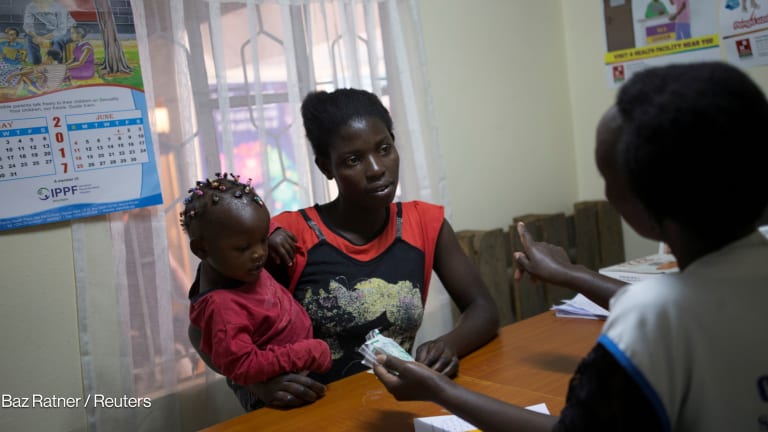
We were honored to be nominated by Grand Challenges Canada for the recent Heroines of Health award celebrated on the sidelines of the 2022 World Health Summit in Berlin. This global health award recognized the work of our organization, Sehat Kahani, a Pakistani telemedicine-based startup.
The difficulty of obtaining visas meant that we missed the opportunity in Berlin to share our expertise about reaching the underprivileged and most vulnerable in Pakistan. This piece is part of our attempt to engage in the dialogue we were unable to achieve in person, like so many of our counterparts across the global south.
The Women in Global Health award has built the profile and credibility of our organization both in Pakistan and internationally, being the only female-founded and female-led startup of its kind in a predominantly male-driven society.
We felt the award presented a unique opportunity to participate in a very important global health gathering to highlight the potential of our work in achieving universal health coverage in a lower-middle-income country, and share the learnings that we believe are transferable in several similar contexts internationally.
As the 27th United Nations Climate Change Conference, COP 27, came to a close in an expensive resort location in Egypt in recent days, we were reminded about the difficulty of access for civil society members from lower- and middle-income countries at another global gathering.
From the archives:
Outrage after visas denied for UK global health conference
Researchers have warned the U.K. is undermining its status as a global health hub after academics from Africa and Asia were blocked from attending the Women Leaders in Global Health conference.
Without context, it can be difficult to understand the consequences of income disparity between countries. According to the World Bank, health expenditure in Pakistan represents 3.4% of total gross domestic product in 2019 compared, for example, with 16.8% in the U.S. As a result, 2019 estimates indicate that 53.8% of patients in Pakistan paid out of pocket for their own health care expenses. In practice, this means that when a health crisis hits poor families, it often drives them into abject poverty.
Pakistan also has a very fragmented health care structure in which 50% of the population lacks access to quality health care. For a country like Pakistan, which has the fifth-largest population in the world, the capacity to deliver health care for just half of its citizens poses a major global health threat.

One of the leading contributing factors to low access to health care is the inadequate number of health care professionals in Pakistan. There are less than 246,000 licensed physicians in the country with an 80% female majority in medical schools. However, as a cultural norm, many women here become doctors because of their improved chances of marriage, but around 40% of women doctors never return to practicing medicine after marriage — a fact commonly referred to as the “Doctor Bride” phenomenon.
A further 17% of physicians leave for better work opportunities abroad, leaving Pakistan with a doctor to patient ratio of 1.1 to 1000, according to 2019 data. In comparison, there were 3.4 doctors per 1000 population on average across OECD countries in 2016.
In response, we established Sehat Kahani in early 2017. It has reached over 1.8 million patients in remote and rural regions of Pakistan. Sehat Kahani means “story of health” in Urdu and we believe that through this organization we are rewriting the future of health in Pakistan. Our service is a widely used platform with the vision to democratize health care access for all using technology and a committed network of doctors.
Our promise is to provide consultations from doctors online using a chat, audio, and video consultation platform within 60 seconds, 24 hours per day, and seven days per week. To date, we have established 48 e-health centers across Pakistan, powered in some states by a mobile application. Our medical helpline also allows patients without online access to reach doctors by phone.
To date, the network of 7,500 predominantly female health care workers has successfully facilitated more than 1.8 million online consultations. As we continue to expand the number of e-health centers in the network, we plan to also integrate pharmacy services improving access to medication.
Working in a patriarchal country presents its challenges as there simply isn’t a level playing field for women. As female co-founders, we worked hard to be recognized as a legitimate business, particularly in relation to our ability to secure financial investment. In one example, during a business meeting, a male senior staff member of a corporation asked whether we had any male financial backing, disbelieving that we could have established a company by ourselves.
In another instance, at an investor meeting, we were told by a male counterpart that we should give him 75% of our shares since we were women and had a family to take care of. Similarly, investor conversations often take place over late night dinners or over tea, which was challenging for us with families.
Despite the challenges, our five-year plan is to scale up and triple our network of e-health centers to 150 in Pakistan, with further expansion internationally into countries with similar health care challenges.
Our platform, the first health care super app of its kind in Pakistan, has the potential to impact up to 17 million users in the years ahead. As women leaders in the health care industry in Pakistan, our vision is that every woman, every child, and every vulnerable person should have access to quality health care when and where needed.
We believe that our specialist experience and learnings in health are valuable across several contexts, and in the future, we welcome the opportunity to share our experiences with the wider global health community, whether in virtual or physical settings — as long as it is possible to gain substantial access to the necessary forums. When visas pose a major barrier to limiting the potential for dialogue, vital insights and expertise are absent from major global health decisions.










